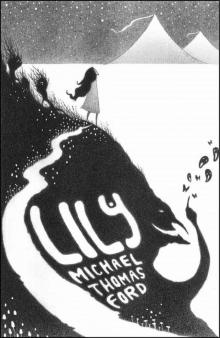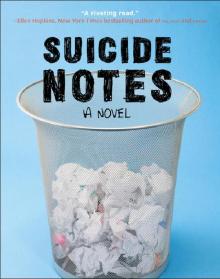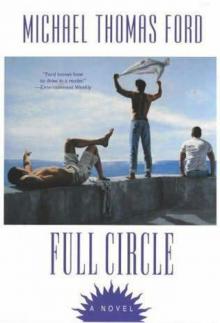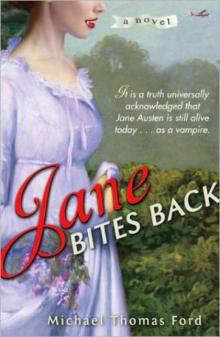- Home
- Michael Thomas Ford
Lily Page 4
Lily Read online
Page 4
Her mother led her to the door of a building where a bright blue sign blinked like a startled child. GOOD EATS it said, bursting into indigo life and then dying again a moment later, only to be resurrected as Lily held her breath waiting to see if each time would be the last, marveling when it was not. She peered in the windows and saw a room filled with tables. People sat at them, laughing and talking, and a woman wearing a red and white checked apron brought them plates of food.
Lily’s mother pushed open the door and led Lily inside. To her surprise, no one looked up to stare at them. The woman in the apron merely waved at them to take a table in a far corner. Lily sat down on the red bench and winced at the feel of the odd material, hot and sticky against her bare legs. She slid into the corner of the booth, where she could see everything in the room. She kicked her feet against the floor as she looked around.
The people at the other tables looked much like the people in the village, but somehow less colorful, as though time had faded them in the way that repeated washings pulled the dye from cloth. Their faces showed the strain of wear, and they seemed tired despite their laughter. Still, their clothes were the clothes of working people, and that made Lily feel more at ease.
The woman in the apron approached the table and handed Lily and her mother each a piece of paper. “What can I get you to drink?” she asked.
Lily looked at her mother, unsure of what to say. “Water,” her mother said, “and two orange sodas.”
The woman left, and Lily looked at the piece of paper she’d been handed. Written all over it were the names of different kinds of foods, some of which she recognized and many of which she didn’t. “What is this?” she asked her mother.
“It’s a menu. This is a restaurant, where people eat. Pick something from the menu and order it.”
Lily had never heard of such a thing, but the idea of being able to eat what she liked appealed to her. She ran her eyes up and down the lists of foods, trying to decide what to have. When the waitress returned with their drinks, she was ready.
“I’d like a hamburger,” she said. She wasn’t sure what it was, but she liked the name of it.
“Do you want cheese on that?” the waitress asked.
Lily nodded.
“How about fries?”
Again she nodded, although she couldn’t imagine what the woman would bring her. She was thankful when the woman turned her attention to her mother.
“I’ll have a tuna sandwich,” her mother said. “With lettuce.”
The woman retreated, and Lily picked up the glass that had been set in front of her. It was filled with orange soda, and the tiny bubbles that ran up the side of the glass fascinated her. She brought the glass to her lips and sipped. Her throat filled with the tart taste of orange, followed almost immediately by a sickening sweetness and a rush of fizzy air that tickled her nose and made her choke. She quickly put the glass down and took a swallow of water. Again she choked, this time because the water tasted dead to her.
“That’s awful,” she said, thankful at least to have the horrible sweet taste out of her mouth.
“Things are different here,” her mother said. “You’ll get used to it. You’ll have to.”
Lily decided that the time was right for asking questions. “Where are we going?”
Her mother’s mouth was set in a firm line. “I don’t know yet.”
“Is this where you came from?” Lily said. “Before—”
“No. I lived in a big city. Now don’t ask anything else. Just remember that if anyone asks, we’re from Pilotsville, and we’re on our way to visit a friend.”
The waitress returned carrying two plates. She set them on the table. “Enjoy.” She smiled. Lily smiled back. Something about the simple way in which the woman moved through the room calmed her.
She picked up the hamburger and took a big bite. She expected it to make her gag, as the drink had, but she was surprised to find that she enjoyed the taste. She gobbled, amazed to find that she was much hungrier than she thought. She picked up a fry and bit into it. Discovering that it was just a length of potato, she delighted in eating the pile on her plate. She couldn’t imagine why anyone would want to take ordinary food and do such outlandish things to it, but she enjoyed it nonetheless. Besides, she could feel the food adding to the stores of fat that suffocated the girl inside her.
As she ate, Lily tried to listen to the conversations of people around her. The air was thick with voices, and it was hard to distinguish one from another, but sometimes she could pull a single thread of words from the tangle and make out what was being said. A few tables away, a man and woman were arguing, although no one looking at them could tell. The man was accusing the woman of being unfaithful to him, and she was denying it. Her voice flowed angry and hot on the air, and Lily could tell that she was lying even as she pleaded innocence and picked at her salad.
Near the door, a group of men spoke — they seemed to be happy, and accompanied their talk with much laughter — their conversation centered on their work at a nearby factory, their wildly stupid boss, and their own unappreciated accomplishments. They appeared to be slightly drunk, and Lily found their behavior comforting in a way she did not entirely understand. Time and again she discovered herself staring at their round, reddened faces and laughing along with them.
Besides the men, the people she found herself watching most intently were a family seated across the room. A mother, father, and daughter sat eating quietly. The girl was about Lily’s age, and several times she looked at Lily and smiled, as though their similarity in years made them friends. In contrast to the rest of the diners, the family said very little. Despite their silence, Lily could tell by the way they passed things to one another that they loved each other very much. When the father took his napkin and wiped something from his daughter’s face, Lily felt tears begin to flow down her cheeks.
“Stop that,” her mother said. “People will stare.”
Lily mopped at her face with her own napkin. “I miss him,” she said. “Don’t you?”
Her mother looked down. “He’s gone,” she said simply.
Even though she knew and feared the answer, Lily asked the question that she had been thinking since the afternoon of her father’s death. “You think I killed him, don’t you?”
Her mother remained silent. Lily looked at the half-eaten sandwich on her plate, a row of jagged bread where her teeth had bitten into it. She wanted to snatch it up and hurl it against the wall, to startle her mother out of her silence. She wanted to tell her about the other girl, the girl who had really killed her father, using Lily’s hands to do it. She wanted to tell her about how the girl had reached out to the villagers during the dance and fed on their deaths. She wanted her mother to open her arms and take her into them.
But she also knew that it did not matter. The girl inside her slept, coaxed into a drowsy slumber by the lullaby of blood singing in Lily’s veins as it beat beneath the layers of fat she had carefully wrought. Even now she felt the warmth of her meal spreading out like a blanket over the sleeping demon, pushing her deeper into hibernation. She picked at the few remaining scraps of food on her plate, thankful for every piece that added to her inner armor.
The waitress arrived again to take away the plates and glasses. As she reached over the table to gather up Lily’s mother’s unfinished sandwich, she placed a hand on Lily’s shoulder. “Can I get you some dessert, honey? We have some nice chocolate cake.”
Lily couldn’t answer, for the moment the woman’s hand touched her, the sleeping girl within her awoke. Lily saw clearly the waitress bent across the counter near the door, a ragged hole gaping in her chest where a gunshot had tattered her skin and blown her heart into scarlet ribbons across the wall behind her. Her mouth was open in surprise, and she still clutched the pencil she carried in her left hand. Stray pieces of paper, bills from the cash register, whirled about her feet.
The woman’s hand continued to rest on Lily’s shoulder as s
he waited for a response. As long as it was there, the scene remained fixed in Lily’s mind, as though her touch formed a conductor between her soul and Lily’s sight like a lightning rod channeled the power of a storm into the ground. She was unable to breathe, yet she could think of no way to remove the woman’s hand from her body and break the connection. She looked up into the smiling face while the image of violent death floated over her still-living features like a mask.
“No,” Lily was able to whisper. “No, thank you.”
“Okay,” the woman said cheerfully as the hole in her chest oozed blood onto the white expanse of the counter. “But it’s not every day I make my chocolate cake. I’ll just bring you the check.”
As soon as she removed her hand, Lily felt cool air fill her lungs again. She looked up and saw that her mother was staring at her.
“It happened again, didn’t it?” she said stonily.
Lily could only nod. She felt ashamed that she had not been able to keep the creature inside her at bay. She had not done enough.
“I thought maybe it was just that place,” her mother said, as though speaking to herself. “I thought getting away would put an end to it.”
“I’m sorry,” Lily whispered. “I’m sorry.”
Her mother said nothing more as she took the check when it came and paid with money that had remained in her purse untouched for more than thirteen years.The bills unfolded like leaves, and the coins clinked as her mother dropped them onto the table. Lily wanted to ask what they were, and what their importance was, but she didn’t dare open her mouth.
Her mother stood and put her hat on. She started to reach for Lily’s hand, as if to pull her up, and then drew back. “Come on,” she said.
Lily followed her out of the restaurant, taking one last glance at the family she had watched throughout her meal. The waitress was putting down two slices of rich dark cake on white plates before the daughter and the mother. One of the slices held a burning candle. As Lily watched, the daughter blew out the candle and took a bite of the cake. Then she pushed the plate towards her father. For a moment their hands touched, and Lily saw that the girl continued to beam with happiness. As Lily and her mother walked out of the restaurant into the shrill electric light, Lily heard the father’s voice rise above the others.
“Happy birthday,” he said as the door shut with a bang.
S I X
“I NEED ONE RADIO sandwich with grass, then burn one and take it through the garden. And table six wants two cackleberries on a raft and a bowl of graveyard stew for the half-pint.”
The waitress slapped the order down and turned away with a weary glance at the new cook. Baba Yaga slipped several pieces of bread into the toaster, then took two eggs from the bowl on the counter and cracked them onto the grill. Checking to make sure the dishwasher wasn’t watching, she removed a third egg and popped it into her mouth. The shell crunched, and she sucked the warm yolk between her teeth.
Coming into the restaurant had been an unexpected decision, but it had proved to be a good one. From her vantage point at the stove she could look out at the diners, making it easy for her to observe the girl and her mother. As Baba Yaga fried hash and grilled hamburgers, the two of them sat across from one another, mostly in silence.
It was the mother who interested her most at the moment. She was a peculiar creature, dark-eyed and pretty in a brittle way, like an old painting that had hung too long on a wall touched by the sun. Her beauty was faded but still very much in evidence. Baba Yaga wondered if her years in the village had done this to her, or if it was the natural progression of time alone. Most people, she thought, would have grown younger in the presence of the strong magic that ran beneath the village. The woman must have fought hard against it.
Baba Yaga had learned what she needed to of the woman and her coming to the village from the owls. The birds recalled her arrival as if it had happened only the day before. She had come there hopeful but afraid, they said, and her fear had deepened with each passing year. It was rumored that she prayed to a dead god, and that she quarreled with her husband about dedicating the child to his service. She refused to leave milk for the kobold of the house, or to greet the white squirrels of the wood when she chanced to see them.
This explained a great deal, Baba Yaga thought. The woman and the village were not a good match. Probably the woman and the man had been equally unsuited to one another. These things happened sometimes. But now the man was dead and it no longer mattered. Well, except for the girl. It was the child who would suffer the most because of the mother’s unhappiness, of course. That was unavoidable.
“If only she’d been kind to the kobold,” Baba Yaga muttered as she opened a can of tuna fish and emptied it into a bowl. “Things might have ended differently.”
She added a hamburger to the grill. She knew it was for the girl, and so she watched it carefully so as not to overcook it. In the meantime, she finished the mother’s sandwich. The lettuce leaf she placed on the bread was just slightly wilted, perhaps a little brown around the edges. She was mean with the mayonnaise. After adding too much celery to it, she leaned over and spit into the bowl before spreading the mixture over the bread.
When the hamburger was done, she plated it prettily, topping it with slices of tomato and onion, then adding a mound of crisp fried potatoes fresh from the oil and sprinkled with just the right amount of salt. Then she tapped the little silver bell that summoned the waitress. She watched as the plates were delivered to the table, waiting until she saw the expression of discovery on the girl’s face after she took her first bite. Satisfied, she removed her apron and handed it to the surprised dishwasher.
“I quit,” she said, and walked out the door.
S E V E N
OUTSIDE, THE ECHO of the man’s words mingled with the scattered sounds of passing cars, barking dogs, and the tired, happy laughter of children playing games in the late summer darkness. All wove together in a chorus that filled Lily’s head and made her very disoriented. She felt out of place and out of time, as though a great force had ripped her away from everything she knew and deposited her, dizzy and breathless, on a strange mountaintop. Even her mother was unfamiliar to her. For the first time in her life, she felt completely alone.
Her mother walked briskly down the sidewalk. Lily had no choice but to follow her, but she remembered how her mother had looked at her in the restaurant, and she didn’t dare ask where they were going. Instead, she looked about her, taking in the town as they passed through it. Moving away from the excited shine of electric lights, the town became less busy. The shadows cast by clouds rolling over the moon wrapped everything in soft blankets, making them appear like giant puppets and animals, and Lily wondered what it would all look like in the daylight. The houses sat quiet as stones, and in some the windows burned brightly. From time to time a child would appear from behind a tree, darting through a yard while another child followed in chase, reaching out to grab a flapping shirt tail or braid. Then they would be gone, and all Lily would hear was the sound of their voices like the calls of nightbirds.
They walked all through the town, past houses and churches (although Lily didn’t know what those were and wondered at the pointed roofs topped by crosses) and the school, past a hardware store and a library and even a small movie theater, where groups of girls and boys Lily’s age stood in loud brassy knots and, a few, in nervous pairs. As she passed them, Lily looked into their faces and wondered how many of them were fighting unwanted visitors within their bodies at the same time as they chewed gum and told one another great lies about their lives and who they really were.
Passing another block of houses, they came to a gas station where a lone attendant rested in a chair, leaning up against the peeling wall of the building. A line of brightly-colored flags strung from the garage to a light pole flapped sadly in the warm night air, and a jumble of moths flapped around the lone bulb that spat dirty yellow light over the man as he sat with crossed arms, waiting for cars to
come through. There were streaks of shiny black grease across his unshaven cheeks, and his stained shirt had the name BURNELL stitched across the pocket in white thread.
When Lily and her mother approached, the man opened his eyes, pushed back his cap, and smiled a crooked smile. His gaze wandered up and down Lily’s mother’s body, then moved on to Lily. The way in which he looked at her made Lily feel that he was seeing past her face to that of the girl inside. She could feel the girl’s heart begin to beat more strongly beneath her own, and she knew that the man’s attention was making her restless. She shifted her eyes from the man’s face to the dirt beneath his chair, which was covered with the discarded remains of the cigarettes he smoked one after the next.
As if reading Lily’s thoughts, the man pulled a cigarette from the crumpled pack in his pocket and lit it with a match he sparked to life with his fingernail. He drew in and then blew out a cloud of smoke, which drifted down over his face as he spoke. “What can I do for you ladies?”
Lily’s mother cleared her throat. “Can you tell me where the bus stops? The bus to Pilotsville? I think it comes through here. At least it did the last time I was here.”
The man nodded. “Still does,” he said. “Matter of fact, it should be through in about ten minutes.”
Lily glanced up and saw that the man was staring at her again. She stared back, searching his eyes for a moment, then looked up at the moths courting the light bulb and let the light fill her head until she saw spots and forgot what had been in his eyes.
“Well, I guess we’ll just wait then,” her mother said. “I guess we’ll just wait right over here. Thank you.”
Her mother went and stood on the sidewalk, her shoes as close to the edge as she could get without being in the street. She held her purse tightly and peered intently down the street, waiting for the faint glimmer of headlights. Lily stood behind her, feeling the man’s eyes on her skin and sensing each time another eddy of smoke flowed from his dirty lips and crept along the ground towards her. The backs of her legs ached from standing so stiffly, and all she wanted to do was find someplace to sit down.

 Jane Bites Back
Jane Bites Back Tangled Sheets
Tangled Sheets Z
Z Jane Goes Batty
Jane Goes Batty Lily
Lily Masters of Midnight: Erotic Tales of the Vampire
Masters of Midnight: Erotic Tales of the Vampire The Road Home
The Road Home Midnight Thirsts: Erotic Tales of the Vampire
Midnight Thirsts: Erotic Tales of the Vampire Suicide Notes
Suicide Notes Jane Goes Batty jb-2
Jane Goes Batty jb-2 Jane Vows Vengeance jb-3
Jane Vows Vengeance jb-3 Jane Fairfax 3 - Jane Vows Vengeance
Jane Fairfax 3 - Jane Vows Vengeance Michael Thomas Ford - Full Circle
Michael Thomas Ford - Full Circle Jane Bites Back jb-1
Jane Bites Back jb-1 Masters of Midnight
Masters of Midnight